- Home
- Marsha Canham
The Blood of Roses Page 3
The Blood of Roses Read online
Page 3
How different from her own experience, Catherine thought bitterly. Strained words exchanged in a library, a sullen retreat to her rooms to pack for a hasty, furtive departure from Rosewood Hall. Her “blissful” wedding tour had consisted of a two-week test of endurance in the back of a cramped, airless carriage; bouncing over military roads that had never been designed with elegant coach wheels in mind; dodging patrols of militia; pitting her wits against a husband who seemed determined to make her suffer every miserable step of the way.
“Catherine … Catherine, wasn’t it simply wonderful?” The new Mrs. Damien Ashbrooke fluttered across the vestibule of the church like a butterfly in flight, her skirts flaring out behind her, a fountain of satin ribbons streaming from her hair. Beaming happily, she took up Catherine’s gloved hands in her own and lowered her voice dramatically, speaking without moving her lips more than a quiver. “Did you see me almost swoon when the reverend started going on about wifely proprieties and motherhood? I swear I could feel every pair of eyes on me, hear everyone start to whisper at once.”
“If they were staring,” Catherine assured her, “it was because you made such a ravishing bride. And if they want to whisper, let them. They’re just being jealous old cows because you happened to snare the heart of the handsomest bachelor in England.”
This last was said with a conspiratorial smile as her brother Damien joined them. He returned her hug and kiss, then, with an elaborate flourish, produced five glittering gold sovereigns from the pocket of his white satin waistcoat.
“Never let it be said an Ashbrooke does not honor his debts,” he said, presenting the coins to Catherine. “However disputatious the terms of the wager might be.”
Catherine and Harriet exchanged a frown.
“Perhaps it comes from the pressure of having to relinquish his freedom,” Catherine suggested blithely. “As I recall, he vowed to remain unencumbered until his fortieth birthday.”
“Thirty, as I recall,” Damien corrected her. “And since I am only six years shy of that goal, the pressure, as you call it, is not too dreadfully overwhelming. Nevertheless, it was you who made the grim prediction that I would not be enjoying my bachelorhood much longer and you who backed the challenge with five gold crowns. To that end, dear Kitty, I concede the wager, and most happily so.”
Uncaring of whose eyebrows might be launched skyward, Damien circled his arms around Harriet’s waist and drew her into a loving embrace. His kiss left the bride with a deep enough blush to make the smattering of freckles across her nose glow through the layers of rice powder.
Harriet’s self-conscious reprimand and Damien’s good-natured retort could not help but put a smile on Catherine’s face. Their happiness was obvious, their love for each other open and eager and completely devoid of any doubts or hesitation. They suited one another in character. Harriet was shy and unprepossessing, utterly devoted to Damien’s wants and needs; Damien was strong and resilient, a caring, gentle, and considerate man who would move heaven and earth to ensure his wife’s contentment. He had not inherited Lord Ashbrooke’s philandering ways. He had certainly sown his share of wild oats, for he was lean and handsome and elegantly suited to delivering lengthy and articulate courtroom dissertations. There had been rumors of a mistress in London and another in Coventry, but to Catherine’s knowledge, he had relegated them both to memory the instant he had wakened to the fact that Harriet Chalmers was no longer a braided, freckled brat in pinafores and ruffled pantalets.
Marriage would suit him, Catherine decided. So would fatherhood.
She looked down at the five gold coins nestled against the gray of her kidskin gloves and remembered that there had been a second part to the wager, double or nothing, that she would win a proposal of marriage from Hamilton Garner before the clock had struck twelve to welcome in her nineteenth year. Did it constitute a win, she wondered, that she had found herself married within the required time limit, even if to another man?
Smiling, she pressed the gold coins into Harriet’s hand. “For my nephew,” she whispered. “Or niece … whichever fate allows.”
“Fate has nothing to do with it,” Damien announced firmly. “I have decided we shall have three sons and three daughters, in that order, and that, by God, is the way it shall be.”
“Really?” Catherine mused. “And if your orders should go awry and you are blessed with only daughters?”
“Then we shall name them all Catherine and send them out as a plague upon the world.”
Laughing, the girls each took a proffered arm and allowed him to escort them out of the church vestibule and into the crisp autumn air. They were instantly surrounded by well-wishers, and Catherine, taking advantage of the opportunity, slipped away from the crowd unnoticed. She was in no mood to engage in verbal fencing matches with the staunch-bosomed matrons who circled like vultures, waiting to glean the latest tidbits of gossip and scandal. Back-stabbing had always been the order of the day, and Catherine had never felt it so keenly or gleefully directed between her own slender shoulders as she had since her return to Derby six weeks ago. Mistress Ashbrooke had acquired a good many enemies and rivals in her vainglorious climb to the top of the social ladder; they were only too eager to collect their due now with a vengeance.
That she had dared to show her face in Derby again after being handed over as prize chattel following a duel between two men who were supposedly her lovers had shocked the community to its core. That she had returned alone might well have made Catherine the laughingstock of ten parishes if not for the fact she had arrived home in the luxury of a gleaming new coach-and-four and that it had required a second coach and six liveried servants to manage the trunks and baggage crammed to overflowing with proof of the wealth and generosity of her new husband.
With Damien steadfast by her side, Catherine had answered the endless rounds of questions. Indeed, Raefer Montgomery was a wealthy man. Indeed, he was an extremely successful businessman; his name and reputation were lauded in shipping circles, for he was a major dealer in the lucrative export trade with the colonies. He was in the colonies now, in fact, and yes, it was a shame he could not have postponed his trip, but at least he had insisted that Catherine return to Rosewood Hall to dispel any concerns her family and friends might have over the marriage.
Sir Alfred’s guilt, if he had experienced any pangs at all, was erased the instant he saw his daughter bedecked in silks and satins and muffled in a cloak of white ermine. Damien had done his part to embellish Montgomery’s character and attributes to the point where Sir Alfred had begun to think of his decision that fateful night as nothing less than providentially brilliant. His own reputation would not suffer from acquiring so influential and enterprising a son-in-law, nor would the Ashbrooke fortune—instantly invested in Montgomery Shipping. If anyone was surprised to learn the extent of her husband’s wealth, it was Catherine; she had assumed it to be as fictitious as his name.
It was just one of the many absurdities she discovered being married to Alexander Cameron: having everything she had ever wanted yet having nothing at all.
She had hoped Damien’s wedding would snap her out of her lethargy, but it became apparent early in the evening that no such miracle would occur. The men, powdered and wigged and prancing about the dance floor like satin-clad harlequins, only made her remember the evenings at Achnacarry more vividly. There the men dressed in tartans and leather, and when they danced, they did so with the pure, reckless joy of celebrating life. Here the women wore frozen smiles and held their noses in a decided tilt upward, their bosoms straining over stomachers laced so tightly it was a wonder they could breathe at all. In the Highlands, the women laughed as heartily as the men; they ate and argued with as much relish as their menfolk and drank the potent uisque baugh without batting a single, demure eyelash.
Her patience dwindling proportionately with the amount of champagne in her glass, Catherine excused herself early from the celebrations and slipped away for a quiet walk alone in the gardens.
In half an hour or so the serious flirtations would be well under way, partners targeted and victims ensnared, and no one would miss her if she slipped up the rear staircase to her bedchamber. Both Damien and Harriet would understand and forgive her; anyone else could leap fully clothed into the duck pond for all she cared.
The Chalmers house was modest by country standards, but its grounds were impeccable. An avid Greek historian, Harriet’s father had transformed the formal gardens into a fairyland of avenues, mazes, and statuaries. One of Catherine’s favorite places was the grotto where Aphrodite, the goddess of Love, dwelled with her silent flock of stone doves, and so it was not entirely by chance that she found herself sitting on an iron bench gazing solemnly up at the cool white face.
“I should hate you for what you have done to me,” she whispered.
There was no response, save for the distant hooting of an owl.
“Indeed you may well laugh, for was there ever a party or soiree where I preferred my own company?”
Sighing, she leaned back and surrendered blissfully to the need to take off her shoes and wriggle her cramped toes in the evening air. The sky overhead was a vast, crystalline amphitheater filled with a million fragments of starlight, and she allowed the smallest smile to steal over her lips, imagining that somewhere, sitting under these same stars, Alexander might be looking up, wondering if she was thinking of him. It was the first time she had considered the possibility—that he might be thinking of her as often as she thought of him, that he might even have regretted his hasty decision to send her away. He had no real faith that Charles Stuart could raise an army capable of combating the might of the British military. He had to pledge his sword alongside those of his brothers and his clansmen because he was too proud and too loyal to do otherwise, but he had admitted once in a whispered confidence that he expected the prince would realize his folly at the first roar of Hanover artillery—of which the Jacobites had none—and would sue for a peaceful resolution before his supply of clean breeches ran out.
Catherine laughed softly, but the sound was barely out of her throat when she turned her head and listened carefully to the breeze ruffling through the branches. The alcove in which she sat was blanketed in shadows, the wroughtiron bench placed well back beneath a cleverly trained arbor of sculpted boxwood. She was grateful for the shadows and the privacy, never more so than when she confirmed the sound of voices and footsteps approaching down one of the paths.
Thinking it might be someone sent to look for her, she quickly thrust her feet back into her shoes and, careful not to rustle a fold of tulle or let a single ruffle catch the shine of starlight, pressed herself as far back into the niche as she could, hoping whoever it was would pass without noticing her.
To her annoyance and discomfort, not only did they not pass by, they halted beside the marble sweep of Aphrodite’s gown and, after a long and cautious scrutiny of the paths that converged like spokes on the statue, they struck up a conversation not ten feet from where Catherine huddled.
“Damned nuisance this. It had best be deuced important to interrupt my nephew’s wedding celebrations.”
Catherine recognized the gruff voice at once belonging to her uncle, Colonel Lawrence Halfyard, a brusque, short-tempered bull of a man who spoke with the blunt authority acquired through twenty-two years of military life. A twitch of the beetling white eyebrows had been known to send a junior adjutant into paroxysms of fear. An equally cryptic slash of his pen could make or break a rising young officer’s career. Hamilton Garner, the man whom her family believed she would marry, had been one of the colonel’s protégés, and it was mainly due to her uncle’s influence that Garner now found himself a captain in His Majesty’s Royal Dragoons, reporting directly to General Sir John Cope.
“C-Captain P-Price, back at headquarters, thought it was important enough, sir,” the second man stammered. “I was ordered directly here the moment I arrived from Edinburgh.”
“Well then, out with it, boy, so you can go directly back.”
Catherine risked peeking around the fringe of boxwood and saw a young corporal standing so rigidly to attention, his shoulder blades were surely scraping together. She had no real desire to eavesdrop on their conversation and was on the verge of showing herself, but the corporal’s next words sent her melting back into the shadows instead.
“As … as you know, sir, General Cope was ordered to Scotland three weeks ago in response to the rumors that Prince Charles Stuart had raised his standard at Glenfinnan and was gathering an army to march south.”
“An army! Hmphf! Bare-legged savages in skirts, more the like. Waste of good military manpower, if you ask me. Damned upstart couldn’t raise his mother’s teat without help. Go on. Go on.”
“Yessir. Well, sir … the general set out from Edinburgh with every good intention of intercepting the prince’s forces and dispatching them back to their farms with a severe chastising. On the way to Fort Augustus, he was met by Captain Swettenham and—”
“Swettenham?” The colonel tore the soggy end of his cigar out of his mouth and spat a shred of tobacco at his feet. “Who the devil is Swettenham?”
“Captain Swettenham, sir. He was with Colonel Guise’s regiment when they were attacked and overpowered in a skirmish with the rebels outside of Fort William.”
“Did you say … overpowered?”
“Y-yessir. Apparently they were outnumbered ten to one. They were caught in an ambush and … and they were held prisoner for a week until eventually being released on their own parole.”
The colonel grunted. “Go on.”
“Yessir. According to the captain, sir, they were in grave fear for their lives in the beginning. They were overrun by a hoard of MacDonalds, who might well have allowed their enthusiasm to overtake them if not for the timely arrival of another clan—the Camerons, it was, led by their chief, Donald Cameron of Lochiel.”
“So. The reports we heard last week were true,” the colonel mused. “Lochiel was one of the more reasonable savages, and it was to be hoped he could help the prince see the futility of his venture and persuade him to return home to Italy.”
“According to Captain Swettenham, it was all he could do to persuade the MacDonalds not to hang them all from the nearest tree.”
“Is that a fact? Churlish bastards. I trust General Cope repaid them in full for their impertinence.”
“W-well, sir, as it happens, he barely avoided leading his own army into an ambush. He had received information that the prince had heard he was on the way and was planning to attack when he attempted to march through the pass at Corriarick. You would have to see the pass to appreciate the gravity of the threat, sir. It is a narrow, winding trail that cuts between two impassable mountain ranges, the entire length of it fraught with cliffs and sheer overhangs, where the mist pools so thick in places a man cannot see his horse’s ears. An armed force of a few hundred rebels could have easily concealed themselves high in the crags and made quick work of several thousand troops caught in the narrows. General Cope held an emergency council with his officers and it was decided to turn northeast and make instead for Inverness, where the ground would be more favorable to a confrontation.”
Colonel Halfyard narrowed his eyes in disbelief. “Are you saying General Cope took his entire force north and left the road to Edinburgh free?”
“N-not entirely, sir. He left the Thirteenth Dragoons at Stirling and the Fourteenth to support the garrison inside Edinburgh Castle—some five hundred seasoned veterans. The general thought it more than adequate protection, assuming the prince would split his forces—as any military strategist would have done at once—and send the majority of his troops chasing after them to Inverness, if only to safeguard his own flank.”
“Charles Stuart is no military strategist! He is a romantic gaylord who thrives on impossible fantasies. Any fool worth his oats would know his first goal would be to reclaim the royal court of his ancestors, and that, my good man, means occupying Holyrood House.”<
br />
The corporal swallowed hard, his Adam’s apple bobbing like a chestnut on a string. “That did indeed appear to be his objective, sir, for the rebels advanced through Dunkeld to Perth, remaining there only long enough to resupply before they struck out for Edinburgh.”
“And General Cope?”
“He was in Inverness, sir. Naturally, as soon as he realized the rebels had no intentions of splitting their forces, he arranged for ships to carry his men back to Edinburgh by sea, but—”
“But by then the Thirteenth Dragoons were under siege? Dear God, are you about to tell me Captain Garner and his men have had to shoulder the burden of Cope’s incompetence?”
“N-not exactly, sir. The captain knew a single regiment could not hold out against an army of several thousand men.”
The colonel’s fist closed around his cigar, removing the abused end from between his teeth. “He retreated?”
“He … thought it best to regroup, sir. To join forces with the Fourteenth and hold the road until support could arrive from the garrison at Edinburgh. Unfortunately, Colonel Guest suffered some delay in responding to his request for reinforcements, and, by the time he thought to do so, the vanguard of the rebel army was already advancing over Colt’s Bridge, the last defense before Edinburgh.”
“And?” The single word was as ominous as a gunshot.
“And—” The corporal flinched, shuffling his weight from one foot to the other. “The men claimed the rebels were led by the devil himself. A tall, black-haired specter mounted on a coal-black stallion fully twice the height and breadth of any other beast on the field. It was said even Captain Garner was so dumbstruck by the hellish sight, his senses deserted him for a time and the captain of the Fourteenth had to knock him down to keep him from charging the bridge single-handed.”

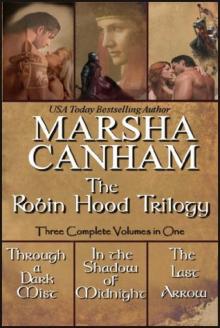 The Robin Hood Trilogy
The Robin Hood Trilogy Pale Moon Rider
Pale Moon Rider Straight For The Heart
Straight For The Heart Across a Moonlit Sea
Across a Moonlit Sea Wind and the Sea
Wind and the Sea Swept Away
Swept Away Through a Dark Mist
Through a Dark Mist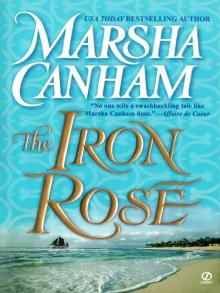 The Iron Rose
The Iron Rose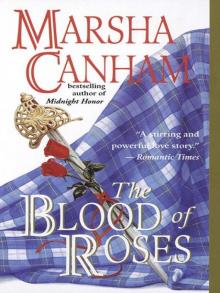 The Blood of Roses
The Blood of Roses The Far Horizon
The Far Horizon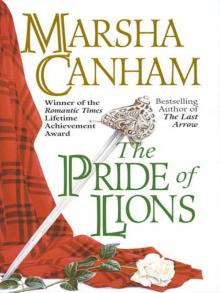 The Pride of Lions
The Pride of Lions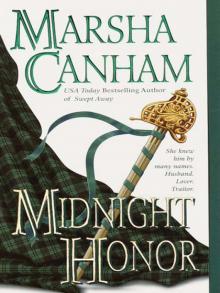 Midnight Honor
Midnight Honor In the Shadow of Midnight
In the Shadow of Midnight China Rose
China Rose